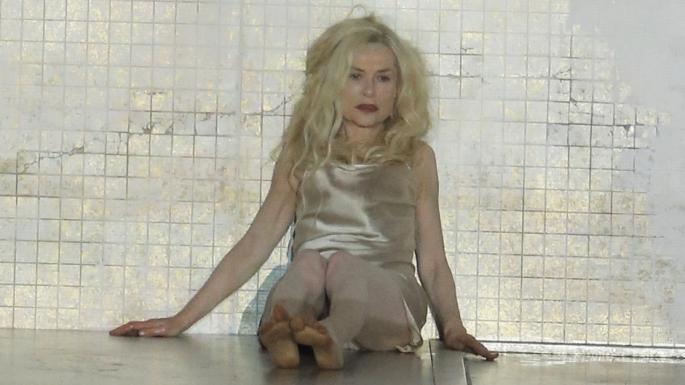Phaedra(s) at the Barbican
reviewed for The Times, 14th June 2016

Isabelle Huppert as Phaedra at the Barbican
Image credit: Pascal Victor/ArtComArt
![]()
Phaedra’s mother, Queen Pasiphae of Crete, fell for a bull, conceiving the Minotaur in consequence. Phaedra herself lusts irredeemably for her stepson Hippolytus. When he rejects her, she accuses him of rape and is memorialised, like Potiphar’s wife, in the dark pantheon of misogynist cautionary tales.
The French actress Isabelle Huppert has set out to reclaim Phaedra for the feminists, with texts by Sarah Kane, Wajdi Mouawad and JM Coetzee (in French, but there are helpful surtitles). If you’re not into menstruation-stained crotches, simulated fellatio or diamanté merkins, you’ll want to give it a miss. But if you’re up for the ride, you’ll find two and a half hours of life-changing theatre in here. It’s just a shame that the performance runs to three hours and 40 minutes.
Huppert is so mesmerising that she largely gets away with it. We meet her first as a raddled Aphrodite for the PornTube age, blond wig flowing over a fur coat and sagging basque. Later, rolling around in bed Serge Gainsbourg-style with her young co-star, Gaël Kamilindi, she’s suddenly girlish — I was reminded of Margot Fonteyn, capturing Juliet’s youthfulness on film even in her late forties.
Mouawad’s text, a clenched fist raised against sexual violence in conflict, has moments of poetry. Yet like many of the European directors showcased at the Barbican this season, Krzysztof Warlikowski’s staging relies heavily on video link, which synced poorly on press night.
Kane, of course, had most of these ideas first, which is why the five-star portion of this triptych is a relatively faithful staging of her 1996 play Phaedra’s Love. Huppert’s blank, pastel-clad housewife degrades herself entirely for a man who, naturally, doesn’t deserve her — Andrzej Chyra’s paunchy, affluenza-afflicted Hippolytus is his own kind of Minotaur.
We end with a stagey literary seminar about desire, based on Coetzee’s novel Elizabeth Costello, which is really an excuse for a scene from Racine’s Phaedra. For some it will be the epitome of Gallic self-indulgence, but, as the heart of the European avant-garde, it’s exactly what the Barbican should be staging.






